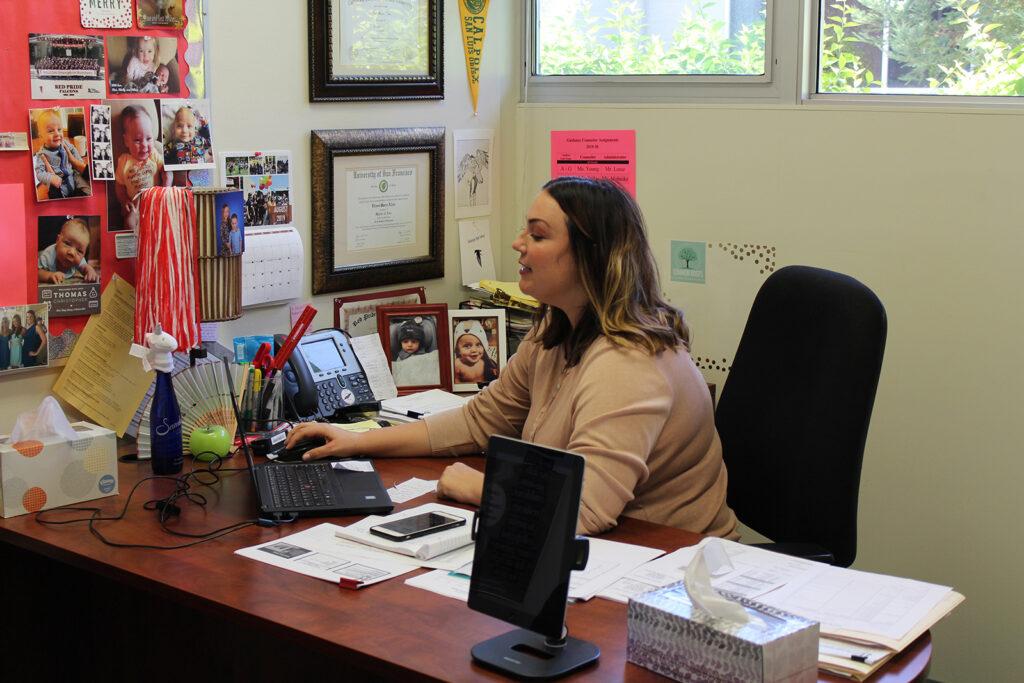Guidance counselor Monique Young doesn’t limit her job to writing reference letters, administering schedule changes or assigning classes. She wants to be a friend and a reliable ear to her students while guiding them through high school.
Many of her students consider her a friendly face to visit for both academic and personal concerns. But at the same time, other students rarely meet with their counselors, finding their advice restrictive and opting mostly for hired counselors instead.
Throughout her 14 years at the school, Young has dealt with various student worries, from relationship breakups to mundane schedule requests. She’s not alone in this regard; guidance counselor Frances Saiki notes that she assists her students with a large spread of academic and personal concerns.
“It could be questions about classes or meeting graduation requirements,” Saiki said. “But it could also be personal concerns, such as feeling anxious or having a conflict with a teacher or a parent.”
But their help only extends to students who actively seek them out. Some do from the first month of freshman year, but many only begin to ask advice as juniors or seniors in dire need of help.
“I always want students to visit because sometimes students wait until there’s an absolute crisis,” Young said. “I hope that kids know that in this part of the office, it’s a nice, comfy place to just talk.”
Junior Isaac Chang has found the guidance counselors to be open and inviting. He felt comfortable discussing his classes, requesting schedule changes or coming in to just talk. Chang felt that his interactions with Young allowed her to gauge his abilities. Chang described how Young made all options clear and trusted him to make the best decision for himself.
“I’m taking four AP classes and Ms. Young told me that two science classes was a bit scary,” Chang said. “But she didn’t discourage me from doing so because she knows I’m used to advanced classes.”
Chang takes all advice from Young seriously, feeling that her experience and professionalism qualifies her to guide students through their high school years.
“Counselors are there for a reason,” he said. “She’s a professional at bringing the best out of students and knowing how to balance their needs based on capabilities.”
By contrast, some students expressed frustration with the school’s guidance counselors, choosing to hire private counselors instead. Especially regarding course selections, several students said they feel that counselors underestimate their capabilities.
Among them is sophomore Etienne Casanova, who noted that counselors were hesitant in letting him register for multiple honors and AP courses.
“Counselors often underestimate your abilities, and sometimes, I just don’t want to take their advice,” Casanova said.
Instead, Casanova plans to use a hired consultant throughout high school. He noted their ability to individualize student needs, help edit college essays, plan extracurriculars, summer programs and assist their students outside of school.
“I think college counselors are better suited for an individual,” Casanova said. “They provide personalized guidance, which is better than the more general advice that guidance counselors can give.”
Young acknowledged that many students share these thoughts but that she prefers students to take on a manageable course load over risking future mental health issues.
“With our courses and the demands of our students, both in school and out of school, we have a good sense of the stress that comes with your schedule,” Young said. “Every year, we see students who end up choosing too many [difficult courses], resulting in increased anxiety, depression and all the negative effects of overdoing it. We always want to help students make healthy, balanced choices.”
Saiki understands the appeal of a hired counselor — with over 1,300 students delegated to four counselors, administering personalized attention is difficult.
“College counselors keep you in line, since you pay them,” Saiki said. “Sometimes it’s nice to take that stress of managing out of a family.”
At the same time, Saiki noted that school counselors essentially provide the same service as a hired counselor.
“Though we don’t meet with you as often, I think all the guidance counselors do essentially the same thing as a college counselor,” Saiki said.
In the meantime, the guidance team of Frances Saiki, Monique Young, Eileen Allen, and Alinna Satake will continue aiding the incoming wave of juniors and seniors. Still, they hope to build a connection with every one of their students.
“We love to see your faces, and three years from now, you might need something,” Young said. “I’d encourage all students to come talk to their counselors for anything.”
























